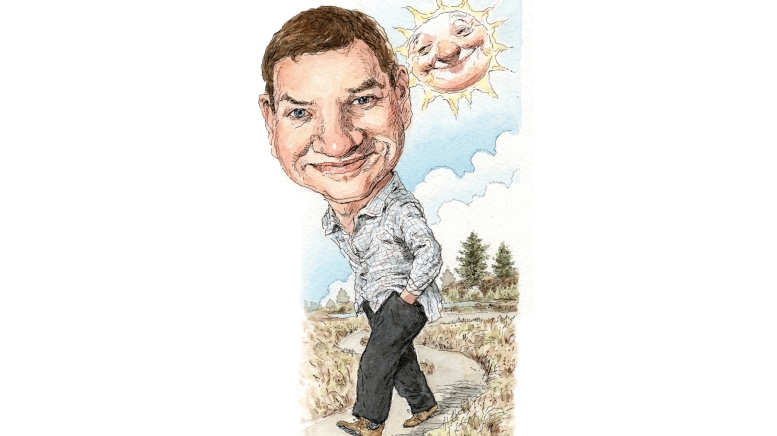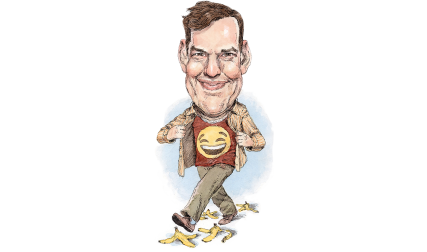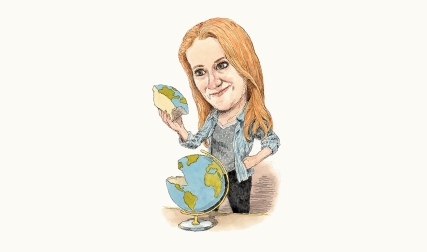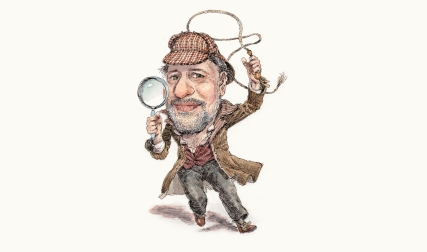Notable: Author of seven books—most recently A World Without Email (2021); contributor to The New Yorker and The New York Times; blogger at CalNewport.com; advocate for deep thinking, time-block planning, and corporate office hours modeled on professors’ office hours to avoid the distractions of unstructured communication
Career: Associate professor of computer science, Georgetown University, since 2016; previously assistant professor
Education: A.B., computer science (Phi Beta Kappa); M.A., Ph.D., computer science, MIT, 2006, 2009
Personal: Lives with wife Julie and three young sons in Takoma Park, Maryland
“The issue we’re having with email in the workplace is that it introduced a new way of collaborating that said, ‘We can figure everything out on the fly with back-and-forth, ad hoc messaging.’ This forces us to be constantly checking our inboxes or Slack or Teams, which destroys our ability to do useful work with our brain.”
“Once you have messages in your inbox that arrive unpredictably and require responses, you’ve lost the game. You can have wins if you can get together with your team and decide you’re going to figure out better rules.”
“We got where we are now by accident. It’s not as if hyper-communication was a management fad. It was an accidental result of email arriving in the workplace.”
“More investors and C-suite types are recognizing that the way we’re working is making us unproductive.”
“I derive my satisfaction from intense cognitive work: trying to solve a math proof, writing an article. An ideal workday means working on a few very difficult, high-stakes intellectual endeavors with real autonomy.”
“It’s when we’re alone with our own thoughts that we can make sense of information we’re taking in. We need downtime from our high-energy processing state or we’ll lose insight into ourselves and become anxious.”
“Hyper-communication is out of control, especially in academia. Everyone needs the time and attention of everyone else. Universities should be the places where we explicitly respect the life of the mind.”
“I had a big transition my freshman year. I shut down the web development company I’d started with a friend during high school. Then I had to give up lightweight crew after I was diagnosed with a congenital heart issue. I had to think about what I really wanted to do.”
“I had read a lot of productivity books while running my business, so I was used to thinking in a way a lot of students don’t. I spent my sophomore fall experimenting with how to take notes, study, and write a paper. I went from being a good student to having a 4.0 GPA. I hadn’t become any smarter, so it made me believe systems matter. It also sparked my first two books.”
“With the shift to ‘knowledge work’ as the focus of our economy, effectiveness became harder to measure. Busyness became a proxy for productivity.”
“Probably 50 percent of the interactions people have with colleagues over email and Slack could be condensed to three hours a week. Three one-hour periods, for example, when a supervisor or subject-matter expert is available to answer questions and has scheduled the time to do so. Where this has been tested, workers have appreciated the clarity.”
“When it comes to using devices and apps in your personal life, you’re in trouble if you haven’t developed a policy. It’s important to start with a positive vision of how you want to spend your time, then work backward to figure out how to deploy technology—or refrain from deploying technology—to support that vision.”
“I get a ton of energy and ideas from my readers via my blog, and I feel very loyal. As the world of social media has gotten emotional and dark, my little community is civil and interesting.”
“I’m surprisingly suntanned for a professor, but it’s because I am paid to think, and why would I want to do that in a fluorescent-lit office when I can be out hiking trails or at a picnic table with my notebook?”




